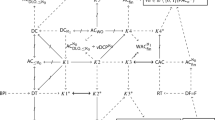Abstract
In set theory without the Axiom of Choice (AC), we investigate the set-theoretic strength of the principle NDS which states that there is no function f on the set ω of natural numbers such that for every n ∈ ω, f (n + 1) ≺ f (n), where for sets x and y, x ≺ y means that there is a one-to-one map g : x → y, but no one-to-one map h : y → x. It is a long standing open problem whether NDS implies AC. In this paper, among other results, we show that NDS is a strong axiom by establishing that AC LO (AC restricted to linearly ordered sets of non-empty sets, and also equivalent to AC in ZF, the Zermelo–Fraenkel set theory minus AC) ↛ NDS in ZFA set theory (ZF with the Axiom of Extensionality weakened in order to allow the existence of atoms). The latter result provides a strongly negative answer to the question of whether “every Dedekind-finite set is finite” implies NDS addressed in G. H. Moore “Zermelo’s Axiom of Choice. Its Origins, Development, and Influence” and in P. Howard–J. E. Rubin “Consequences of the Axiom of Choice”. We also prove that AC WO (AC restricted to well-ordered sets of non-empty sets) ↛ NDS in ZF (hence, “every Dedekind-finite set is finite” ↛ NDS in ZF, either) and that “for all infinite cardinals m, m + m = m” ↛ NDS in ZFA.
Similar content being viewed by others
References
Banaschewski B., Moore G.H.: The dual Cantor–Bernstein theorem and the partition principle. Notre Dame J. Form. Logic. 31(3), 375–381 (1990)
Cohen P.J.: The independence of the continuum hypothesis. Proc. Nat. Acad. Sci. USA. 50, 1143–1148 (1963)
Cohen P.J.: The independence of the continuum hypothesis. II. Proc. Nat. Acad. Sci. USA. 51, 105–110 (1964)
Halpern J.D., Howard P.E.: Cardinal addition and the axiom of choice. Bull. Am. Math. Soc. 80(3), 584–586 (1974)
Higasikawa M.: Partition Principles and Infinite Sums of Cardinal Numbers. Notre Dame J. Formal Logic 36(3), 425–434 (1995)
Howard P.E., Rubin J.E.: The axiom of choice and linearly ordered sets. Fund. Math. 98, 111–122 (1977)
Howard, P., Rubin, J.E.: Consequences of the axiom of choice: Mathematical Surveys and Monographs. Am. Math. Soc. Providence, RI, 59 (1998)
Jech, T.J.: The Axiom of Choice Studies in Logic and the Foundations of Mathematics, 75, North-Holland, Amsterdam, (1973). Reprint: Dover Publications, Inc., New York, (2008)
Jech, T.: Set Theory, The Third Millennium Edition, Revised and Expanded. Springer, Berlin, (2002)
Karagila A.: Embedding orders into the cardinals with DC κ . Fund. Math. 226, 143–156 (2014)
Kunen, K.: Set Theory. An Introduction to Independence Proofs, Studies in Logic and the Foundations of Mathematics, 102, North-Holland, Amsterdam, (1980)
Lévy A.: The interdependence of certain consequences of the axiom of choice. Fund. Math. 54, 135–157 (1964)
Moore G.H.: Zermelo’s Axiom of Choice. Its Origins, Development, and Influence. Springer-Verlag, New York (1982)
Pelc A.: On some weak forms of the Axiom of Choice in set theory. Bulletin de l’Académie Polonaise des Sciences, Série des Sciences Mathématiques, Astronomiques, et Physiques 26, 585–589 (1978)
Rubin A.L., Rubin J.E.: Weak forms of the Axiom of Choice and the generalized continuum Hypothesis. Math. Logic Quart. 39, 7–22 (1993)
Sageev G.: An independence result concerning the axiom of choice. Ann. Math. Logic 8, 1–184 (1975)
Solovay R.M.: A model of set theory in which every set of reals is Lebesgue measurable. Ann. Math. 92, 1–56 (1970)
Tarski A.: On the existence of large sets of Dedekind cardinals. Notices Am. Math. Soc. 12, 719 (1965)
Truss J.K.: Axiom of choice for linearly ordered families. Fund. Math. 99, 133–139 (1978)
Author information
Authors and Affiliations
Corresponding author
Rights and permissions
About this article
Cite this article
Howard, P., Tachtsis, E. No decreasing sequence of cardinals. Arch. Math. Logic 55, 415–429 (2016). https://doi.org/10.1007/s00153-015-0472-5
Received:
Accepted:
Published:
Issue Date:
DOI: https://doi.org/10.1007/s00153-015-0472-5
Keywords
- Axiom of Choice
- Weak axioms of choice
- Cardinals
- Decreasing sequence of cardinals
- Dedekind-finite sets
- Dedekind sets
- Permutation models of ZFA
- Symmetric models of ZF
- Jech–Sochor Embedding Theorems



